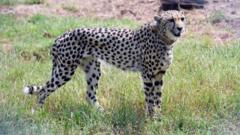Park officials noted that while it is not unusual for staff to assist cheetahs when they come too close to the park's border, such actions must be carried out by trained individuals to avoid potential human-wildlife conflicts. Additional Principal Chief Conservator of Forests Uttam Kumar Sharma explained that the man’s actions contradicted established guidelines, emphasizing that only those with specific training are permitted to engage closely with cheetahs.
Though initial reactions to the video were characterized as "heartwarming," many social media users expressed concerns regarding the implications of such encounters for both humans and animals. Some critics suggested that park authorities should instead focus on creating permanent water sources in the park to meet the needs of the cheetahs, particularly during the sweltering summer months.
Tensions have risen in surrounding villages as cheetahs occasionally stray into agricultural fields, leading to conflicts, including instances of villagers throwing stones at the animals to protect their livestock. According to reports, this situation has prompted officials to promote awareness campaigns aimed at fostering coexistence between villagers and the newly reintroduced big cats.
In an ambitious effort to repopulate the cheetah species, twenty cheetahs were brought from South Africa and Namibia to Kuno National Park between 2022 and 2023. However, concerns have arisen over the survival of these animals, as eight have died from various causes, eliciting doubts about the appropriateness of the park's conditions for the species. Experts involved in the translocation efforts have raised alarms regarding inadequate animal monitoring practices and veterinary care, with a group of South African and Namibian specialists expressing their concerns in a letter to India’s Supreme Court. Despite these worries, park authorities insist that there are currently 26 cheetahs within the park, including both wild and those in enclosures.
Looking ahead, 20 additional cheetahs are expected to arrive from South Africa this year, as officials coordinate with international task forces to ensure the safety and success of the reintroduction program.
Though initial reactions to the video were characterized as "heartwarming," many social media users expressed concerns regarding the implications of such encounters for both humans and animals. Some critics suggested that park authorities should instead focus on creating permanent water sources in the park to meet the needs of the cheetahs, particularly during the sweltering summer months.
Tensions have risen in surrounding villages as cheetahs occasionally stray into agricultural fields, leading to conflicts, including instances of villagers throwing stones at the animals to protect their livestock. According to reports, this situation has prompted officials to promote awareness campaigns aimed at fostering coexistence between villagers and the newly reintroduced big cats.
In an ambitious effort to repopulate the cheetah species, twenty cheetahs were brought from South Africa and Namibia to Kuno National Park between 2022 and 2023. However, concerns have arisen over the survival of these animals, as eight have died from various causes, eliciting doubts about the appropriateness of the park's conditions for the species. Experts involved in the translocation efforts have raised alarms regarding inadequate animal monitoring practices and veterinary care, with a group of South African and Namibian specialists expressing their concerns in a letter to India’s Supreme Court. Despite these worries, park authorities insist that there are currently 26 cheetahs within the park, including both wild and those in enclosures.
Looking ahead, 20 additional cheetahs are expected to arrive from South Africa this year, as officials coordinate with international task forces to ensure the safety and success of the reintroduction program.



















